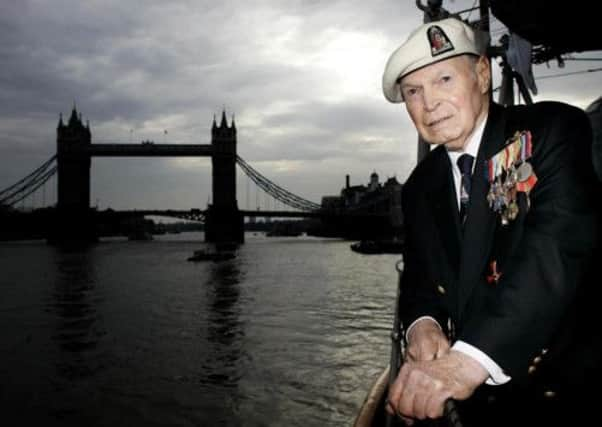Scots Arctic convoy champion dies aged 93


Commander Eddie Grenfell, who was born in Peterhead and schooled in Montrose, has died three months after receiving the first Arctic Star, the medal created to recognise members of one of the most perilous campaigns of the Second World War.
Among the first to pay tribute to Cdr Grenfell was the head of the British armed forces, General Sir David Richards, who presented him with his medal in Portsmouth Guildhall on 19 March.
Advertisement
Hide AdAdvertisement
Hide AdHe said: “I was delighted and truly humbled to be able to present Commander Eddie Grenfell with his Arctic medal.
“Eddie was a young sailor when he endured the hardships of the Arctic convoys which Winston Churchill called ‘the worst journey in the world’.
“It is in great part through his tireless efforts that the achievements and endurance of those involved in the convoys have been recognised.”
Cdr Grenfell campaigned for medals to be awarded to convoy veterans for almost two decades.
He was a young Royal Navy sailor when he was sent to serve on the Merchant Navy ship the Empire Lawrence as it sailed with a convoy to the Soviet port of Murmansk in 1942.
The ship never made it after suffering six direct hits by bombers, creating a giant fireball which threw Cdr Grenfell through the air. Miraculously, he survived and, after a period in a Russian military hospital, sailed home and went on to have a distinguished war.
The convoys between 1941 and December 1944, which mostly sailed from Loch Ewe, in the north-west of Scotland, kept open supply lines to Soviet ports.
The campaigns accounted for the lives of around 3,000 merchant and Royal Navy sailors, around 9 per cent of all those who sailed – the highest casualty rate of any of the sea campaigns.
Advertisement
Hide AdAdvertisement
Hide AdBut after the war their sacrifice was ignored as they were deemed to have helped the Soviet Union, which was the new enemy in the Cold War.
Cdr Grenfell took up the medal campaign in the early 1990s when the Russian Convoy Club decided to challenge the decision.